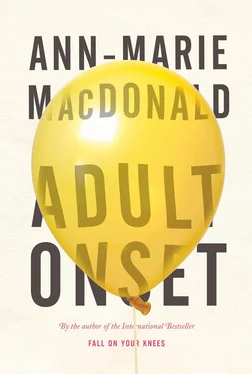Candace addresses her charge in forthright full sentences. “Hello, Maggie, how are you today?”
Maggie responds in kind. “I fine, Candies, I will go to the park with you.”
Mary Rose follows suit. “Maggie, what would you like to do at the park?”
“No.”
Mary Rose laughs in order to show Candace how easygoing she is, then takes charge. “By the way, Candace, we’re going to try phasing out Maggie’s morning nap.”
“Oh, I thought we’d already done with that, I’ve been keeping her up my mornings, sorry, did you want me to put her down now?”
“No, no, yeah, we’ve done with it, I just didn’t know if I’d mentioned it. Great, thanks.”
Maggie sobs hysterically when her mother goes out the door. Mary Rose tells herself it is a sign of healthy attachment.
Behind her, she hears Candace say, “Here now, Maggie Muggins, what’s got your knickers in a twist?”
•
After Christmas, her mother dies. She does not go home to Canada for the funeral. She has no baby but she still has a little one. She hears it crying. Is it big enough to climb from its crib? She lies down on the couch. The light on the balcony stays the same for a long time. She hears her two-year-old crying. Feels it clawing her hair.
•
Twelve minutes later, Mary Rose is locking her bike out front of Mount Sinai Hospital downtown on University Avenue, a six-laned wind tunnel lined with medical centres and insurance towers, when her brother phones and says, “I need you to come look at my butt.” He is at the Roots store in the Eaton Centre a couple of blocks away on Yonge Street.
“I’d love to, but I’m about to get a sonohystogram.” He doesn’t ask what that is.
By 10:45 a.m. she is on the table in the examination room, feet in the stirrups. The gynecologist, Dr. Goldfinger — he can’t help it, he was born with the name — removes the “wand” and hands it to the nurse. It has a camera at the tip and is wearing a condom. Mary Rose was assured she would be getting a female gynecologist but has wound up not caring because Dr. Goldfinger is over sixty and very good at his job. And it isn’t as if female Dr. Irons — another birth defect — had the lightest touch with the speculum when she diagnosed the “benign fibroids” that have been shredding the lining of Mary Rose’s uterus.
She was given a choice: tough it out till after menopause, when the estrogen-guzzling fibroids will waste away on their own; or have a new procedure wherein the surgeon will cut off the blood supply to her uterus, thereby inducing an infarction, then implant her with a morphine pump for a few days — in other words, her uterus will have a heart attack and die and it will hurt like hell. Or she can have a hysterectomy. Her mother had a hysterectomy back when they lived in Kingston. It was after her second miscarriage — third? — and the doctor pretty much ordered it, but Dolly asked the priest for permission first. Afterwards, she started taking what she called her “nice mother pills.” Sometimes she would forget.
Mary Rose’s uterus is one organ she has always preferred to forget she has, and this she managed pretty well, its monthly Calvarys notwithstanding, but she cannot bring herself to mount an all-out assault on it. “A poor thing, Sir, but mine own.” Her journey through the gynecological-industrial complex has taught her that the “perimenopausal” uterus is seen the way the appendix used to be: as a disease magnet that ought to be removed at the first peep. But who really knows? While it is too late for her tonsils, Mary Rose does still have her appendix, that vestigial organ of digestion, and thus is among those who stand to survive should the species be reduced to eating bark for survival post — climate change. It is like the section found at the end of some books: Appendix . Stuff which isn’t necessary now but might be vital later. It is difficult, however, to imagine the other organ doubling as a literary term: Uterus .
Mo said, “They’ll try to tell you it’s useless, but it isn’t. It’s doing something, hang on to it.” So she toughed it out until six months ago when she overheard a conversation through the fug of the change room at the pool: “Try soy milk, it’s loaded with phytoestrogens and it’s better than taking pregnant horse piss, which is what Premarin is.” It took a moment for the meaning to congeal, but when it did, she froze. In an attempt to be virtuously vegetarian, Mary Rose had, for the previous year, been replacing everything with soy. Soy milk, soy burgers, soy bacon — there is nothing that cannot be textured into soy, the great shape-shifter. Like syphilis, it disguises itself, the Zelig of the food world. She had always suspected there was something spooky about soy. Now she realized she had been feeding the fibroids all along. She went straight home from the pool and flushed her entire soy stash like a drug dealer a step ahead of the cops.
She turns her head to watch Dr. Goldfinger as he peers at the pulsating field of grey on his computer screen that is a window unto her womb. She strains to spot them amid the murk — they are only fibroids, but are they getting better or worse? A nurse swishes in, whisks the condom off the camera and swishes out again. It is probably safe to take her feet from the stirrups now — bare steel, unlike the ones in her family physician’s office, thoughtfully covered with oven mitts. She searches Dr. Goldfinger’s face for a sign of the verdict. In a previous era he would be wearing a waistcoat and cravat and treating her for “hysterical pregnancy”—it’s what got Charlotte Brontë. A second nurse swishes in for no apparent reason, and swishes back out. Mary Rose knows how lucky she is: not only does she not live next to a graveyard in Yorkshire, she has merely had to endure month-long periods with their attendant child-birth-calibre contractions, referred to as “cramps” by the uninitiated, along with “heavy days” wherein she has been delivered of miscarriage-sized clots of uterine tissue. They dropped from her body into the toilet with the plop of a hearty soup — evidence of a transitioning female reproductive system that will not go down without a gorey fight. It all flies in the face of the lithe androgyny she has cultivated her entire life.
She didn’t tell Hil what her doctor’s appointment was about, no need to get all menopausy with your girlfriend. Partner. Wife. Whatever. Why isn’t there a better word? Apart from the flagrant lover , sexless partner , and dowdy spouse … She dislikes most of the words associated with femaleness. She can barely say the word period unless referring to a BBC miniseries. They are icky words, embarrassing to say. Or else inadequate: Vagina —as if that told the whole story. Lesbian : lizardy. Menopause : a bilious woman sitting next to you on the bus to Brockville. Oddly, uterus is okay, resembling, as it does, an order of nuns.
“They’re shrinking,” says Dr. Goldfinger. He smiles briefly, and leaves the room.
Yes! She could fist-pump for joy, but that would be too American.
Nurse number one swishes in again and passes her a massive sterile wipe for the lubricant, and as she is mopping up, the second nurse returns and the two of them, smiling shyly, produce copies of JonKitty McRae: Journey to Otherwhere and JonKitty McRae: Escape from Otherwhere along with a pen.
She writes:

Then she puts on her pants.
“When’s the third one coming out?”
•
She thinks it may still be winter, but it is difficult to tell because even if she were to sit up, from her vantage point on the couch, the balcony door affords a view only of treetops and sky — the Black Forest is thick with evergreens so, unless there is snow, she cannot be sure. It occurs to her to pin a calendar to the wall so that she will be reminded, without getting up, what season it is. She is lying on her side on the couch, one hand beneath her cheek, the other extended, palm up. The moonstone is on this hand, and her baby is dead. She wants to phone her mother long distance and tell her, “Mumma, I lost the boy.” Then she remembers, her mother is dead.
Читать дальше













